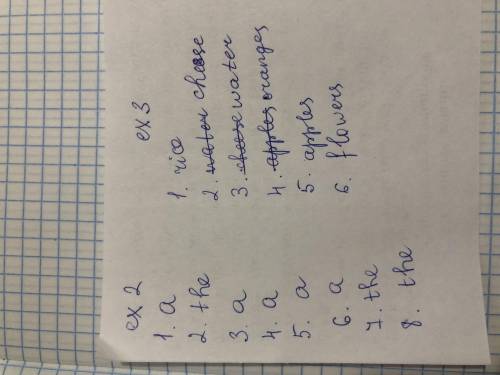1. Choose one variant / Выберите один вариант
“No sensible person will want to see it”. – She said (that) no sensible person..
a) would want to see it b) will want to see it c) did want to see it
2. Past Perfect:
a) did + infinitive b) will + infinitive c) had + Past Participle
3. Match two columns / Сопоставьте две колонки. Conditionals.
1) Zero a) to talk about facts
2) First b) to talk about situations that have a chance of happening in the future
3) Second c) to talk about situations which are impossible now or in the future
4. Define the type of conditional / Определите тип условного предложения
If I keep training her, she will eventually give me all of it.
a) zero b) first c) second
5. Match each word with its meaning / Сопоставьте слово с его значением
1) indigestion a) мода
2) hay fever b) кроссовки
3) toothache c) штраф
4) fashion d) несварение желудка
5) trainers e) сенная лихорадка
6) murderer f) зубная боль
7) lawyer g) заносчивый
8) a fine h) например
9) predictable i) юрист, адвокат
10) big - headed j) предсказуемый
11) e.g. k) убийца
6. You ___ fill in all the form – your name and signature are enough.
a) must b) mustn’t c) don’t have to
7. Everybody is coming, ____
a) aren’t they? b) isn’t he? c) isn’t they?
8. We use the Present Simple…
a) to talk about facts, habits and routines
b) to talk about action happening now
c) to talk about situations that have a chance of happening in the future.
9. We use the Present Perfect Continuous to talk about:
a) an action that started in the past but is still continuing; a past activity with a result in the present
b) situations which are impossible now or in the future
c) news, recent actions, a finished action if we don’t say exactly when it happened.
10. We use the Past Continuous...
a) to describe finished actions; to tell the main events in a story in order
b) to talk about an action that happened before another action in the past
c) to describe things which were in progress at a specific time in the past; for temporary situations/habits.
11. Match two columns / Сопоставьте две колонки
We use:
1) must / have to a) to talk about prohibition
2) mustn’t b) to talk about ability in the present/past
3) should / ought to c) to talk about necessity
4) can / could d) to talk about duty or give advice
12. We use “will”:
a) to talk about plans, intentions and ambitions
b) when we make a spontaneous decision
c) to talk about information on a timetable
13. Do you mind if I go with you? The first bus___ until 10 a.m.
a) isn’t going to leave b) don’t leave c) doesn’t leave
14. Match two columns / Сопоставьте две колонки
1) Sergei Korolev a) a famous scientist
2) Ivan Papanin b) a great Russian ballerina who won world recognition
3) Galina Ulanova c) Soviet polar explorer, doctor of geography
4) Anna Akhmatova d) one of the major poets of the Silver Age
15. begin, continue, dislike, hate.
a) verbs always followed by the –ing form (gerund)
b) verbs followed either by the –ing form (gerund) or by the infinitive with little or no change in their meaning
c) verbs followed either by the –ing form (gerund) or by the infinitive with a change in their meaning
16. Match two columns / Сопоставьте две колонки
1) After he had finished his dinner, he started playing… a) Future Simple
2) I usually only come here on Friday evenings. b) Past Perfect
3) My wife is shopping at the moment. c) Past Continuous
4) We have already played more than 30 gigs. d) Present Simple
5) I have been writing songs since I was 16. e) Present Perfect Continuous
6) I ran forward and pushed through the crowd. f) Present Continuous
6) I ran forward and pushed through the crowd. f) Present Continuous
7) It was 10 o’clock. I was jogging. g) Past Simple
8) There will be millions of deaths. h) Present Perfect
207
476
Ответы на вопрос:
Популярно: Английский язык
-
Write a paragraph about your shop...
 янаневолина10.05.2021 21:21
янаневолина10.05.2021 21:21 -
Ask as many questions as you can to get additional Information: The idea of a...
 maga05050826.03.2020 14:33
maga05050826.03.2020 14:33 -
перевисти 8 класс ваулина стр 44 упр 1 там слова начинаются с author до bank teller...
 Корни02.03.2020 06:17
Корни02.03.2020 06:17 -
Answer the questions 1. Where a Young writer meets Pi patel? 2. What Pi s Family...
 sofiabts06.02.2020 09:05
sofiabts06.02.2020 09:05 -
He has been in Australia A. Many times b. five times c....
 subbotkinaira21.01.2021 23:30
subbotkinaira21.01.2021 23:30 -
1.You have to pay extra money if you take too with you. many luggage many much...
 okorfeda01.03.2022 12:30
okorfeda01.03.2022 12:30 -
V. Выберите предложения, содержащие конструкции в Passive Voice. 1 She will be...
 Ъъъъъъъъъъъъъъъъ20.05.2022 04:51
Ъъъъъъъъъъъъъъъъ20.05.2022 04:51 -
I. Поставьте глаголы в требующуюся форму: If Ann (to practice) hard last week,...
 НЕЗНАЙКА228337122.08.2022 10:41
НЕЗНАЙКА228337122.08.2022 10:41 -
Артикли, предлоги 1. ... Ben Nevis is the highest mountain in ... UK. a) - , the...
 rizvanovagyla328.01.2020 01:01
rizvanovagyla328.01.2020 01:01 -
ОЧЕНЬ 1) Jo is so smart that she ________ every exam without even trying. pass...
 julia77mama04.12.2021 19:57
julia77mama04.12.2021 19:57

